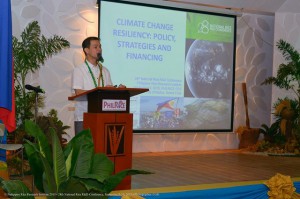The agriculture sector needs policy reforms in order to be resilient, a prominent climate change expert said. 
During the opening of the 28th National Rice Research and Development Conference at PhilRice, 9 Sept, Dennis Dela Torre of the UP National College of Public Administration and Governance (NCPAG) and House of Representatives Special Committee on Climate Change, said that there are many challenges that hinder the agriculture sector to become a key development investment area.
Policy reforms
Dele Torre called for policy reforms that would direct the focus of government institutions, the private sector, and even foreign funders to agriculture.
The Agriculture and Fisheries Modernization Act of 1997 and the Agri-Agra Act of 2009 which have provisions on finance mobilization also needs to be reviewed.
He said that under the Agri-Agra law, the bank sector should devote 25% of loanable amounts to agriculture but studies reveal that banks are just willing to pay the fines.
“We should look at our farmers as potential targets for investment in human capital,” Dela Torre argued.
Meanwhile, he encouraged the Department of Social Welfare and Development (DSWD) that skills in agriculture must be one of the conditions in the Pantawid Pamilyang Pilipino Program (4Ps), a conditional cash transfer scheme of the government to address poverty.
Climate lens and planning
Data from PAGASA on the annual mean temperature in the Philippines projects that there would be a widespread warming in most parts of the country by 2020 and 2050. Dela Torre then emphasized the importance of careful planning based on historical and projected data.
According to him, efforts against climate change must look both at the past and what will happen in the future to plan properly.
Recently, there have been a growing concern on saline intrusion and the projected sea level rise that affects coastal integrity. This serves as a threat to agricultural production areas near the coastlines. Hence, research institutions such as PhilRice must continuously develop saline-tolerant crop varieties to address this challenge.
Among the saline-tolerant varieties developed by PhilRice are NSIC Rc184 (6.3 t/ha maximum yield), NSIC Rc186 (4.2 t/ha maximum yield), NSIC Rc188 (3.8 t/ha maximum yield), NSIC Rc190 (5.1 t/ha maximum yield), and NSIC Rc290 (5.7 t/ha maximum yield).
Dela Torre also cited that if irrigation infrastructures failed to resist environmental threats, its quality would definitely be compromised. As a result, implementing agencies would then reinstitute innovations which would lead to a pain point in funding.
The former Chief on Research and Policy Development of CCC said that projection and planning are important keys to withstand all environmental threats.
“That’s what climate change is forcing us to do ― to think better, to design, and plan better,” he reiterated.
The 28th National Rice Research and Development Conference is annually hosted by PhilRice that gathers around 500 researchers, academicians, students, farmers, and extension workers from all over the country.




